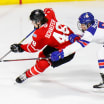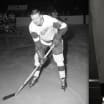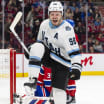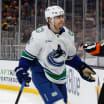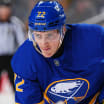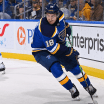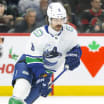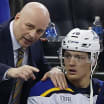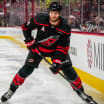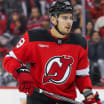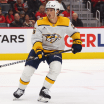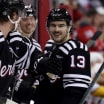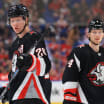The Coaches Room is a regular feature throughout the 2022-23 regular season by former NHL coaches and assistants who will turn their critical gaze to the game and explain it through the lens of a teacher. Mark Recchi and Phil Housley will take turns providing insight.
In this edition, Recchi, a three-time Stanley Cup champion and Hall of Fame player who has been an assistant with the Pittsburgh Penguins and New Jersey Devils, writes about the Carolina Hurricanes' forecheck pressure, how they do it and why it's so effective.
Hurricanes' forecheck key part of their identity, success
Recchi says Carolina pressure creates turnovers, limits odd-man rushes
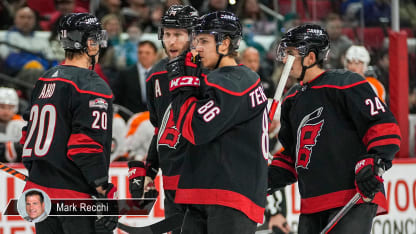
By
Mark Recchi
Special to NHL.com
The Carolina Hurricanes will be in the news this week because they're playing their first outdoor game.
Anybody watching the 2023 Navy Federal Credit Union NHL Stadium Series game between Carolina and the Washington Capitals at Carter-Finley Stadium on Saturday (8 p.m. ET; ESPN+, ABC, SN360, TVAS2, SN NOW) will see the Hurricanes' relentless forechecking pressure. If you're paying attention to it, it'll be fun to watch.
That pressure, how they apply it, where they apply, and how effective they are in applying it, is arguably the biggest reason why the Hurricanes have been one of the best and most consistent teams in the NHL since Rod Brind'Amour took over as coach in 2018-19.
Having coached against the Hurricanes in the Metropolitan Division with the Pittsburgh Penguins and New Jersey Devils, believe me when I tell you that it's the type of pressure that gives players nightmares and coaches headaches.
It is the reason why the Hurricanes have been the best team in the NHL at suppressing shots on goal this season (26.3 shots against per game) and why they have been since 2017-18 (28.3 shots against per game).
They do it so well because they spend so little time in the defensive zone, and that starts with their hard forecheck pressure. They apply it on both the weakside and the strongside of the ice, which is rare in the NHL, where most teams apply weakside pressure on the forecheck.
The Hurricanes' forecheck is two players coming hard and more pinching down the walls. Their defensemen have to work hard to get up in the zone. They can't be lazy. They're a big part of it. If you rim the puck around to the weakside, they're coming down the wall and stuffing that winger. It goes back to the other side, they're doing it there too.
The end goal is to push the opponent back into more trouble, leading to turnovers and limiting odd-man rushes against.
That the Hurricanes don't give up a lot of odd-man rushes shows how committed they are and how hard they pressure. You can't leave the zone early on them because you're going to have to make a great play on the wall to relieve the pressure.
Then when they're in the defensive zone they're playing man-on-man defense because they're so mobile. A lot of teams don't play man on man because of that, but the Hurricanes are able to do it and that only makes it harder on the opposition.
I remember the Anaheim Ducks a couple years ago played this style and didn't quite have the team for it. They tried and they got eaten up because of it.
The Columbus Blue Jackets tried to play it last season, but they had a young team and it became problematic at times.
The Hurricanes are built for this pressure style. Their defensemen are all mobile. Their centers are committed. Their wingers are bought in. Everyone can skate. Everyone moves their feet.
And that's the thing, you really have to be mobile and bought in to playing this hard style in order for it to be successful. You have to know that as soon as the puck is coming around the wall, you're applying pressure. You can't sit back, wait and watch. You'll get caught and it will be noticeable. You can't hide.
The players in Carolina know their job and their role. There are no gray areas. But that's Rod Brind'Amour. It's black and white with him. Know your details. Know everything. Buy in. Play the system. Play it the right way. That was Rod as a player and that's what he expects as a coach.
There are some hard nights for them. For example, when they don't have their legs it's noticeable because teams are getting up the ice quickly on them, odd-man rushes are happening.
I remember in Pittsburgh when we were effective at beating it we'd play the puck "D" to "D" and then back around. It loosened them up a little, created more ice to work. But then they'd go back and make an adjustment after the first period and the pressure would return if they had their legs.
There just aren't a lot of ways to beat it when they're on top of their game, and the Hurricanes are typically on top of their game.
So when you're watching the outdoor game spectacle Saturday night, pay close attention to the Hurricanes forecheck and how the Capitals handle it. If the Hurricanes are on top of their game, chances are the Capitals will struggle to get the puck up the ice and out of the zone.
